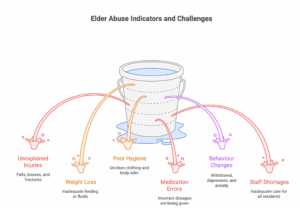Placing a loved one in a nursing home is a deeply personal and often difficult decision. You entrust them to the care of professionals, expecting them to receive the dignity and attention they deserve. Sadly, neglect can occur, and bed sores – also known as pressure ulcers – are often a visible sign that something is wrong. This article explains what you need to know about nursing home negligence, bed sores, and what steps you can take to protect your family member.
Understanding Nursing Home Negligence and Bed Sores
Nursing home negligence occurs when a facility or its staff fails to provide the standard of care necessary to protect a resident’s health and well-being. This failure can manifest in numerous ways, including inadequate staffing, poor hygiene, improper medical care, and a lack of attention to residents’ needs. Bed sores are a direct result of prolonged pressure on the skin, most often occurring in individuals with limited mobility. They develop when constant pressure restricts blood flow to the skin, causing tissue damage and ultimately, an open wound.
Identifying Bed Sores: A Sign of Potential Neglect
Bed sores aren’t simply an unavoidable part of aging. They’re often a clear indicator of inadequate care and can progress rapidly. Early detection is vital. Look for:
- Changes in skin colour: Redness, purple, or blueish discolouration, particularly over bony areas like heels, hips, tailbone, and elbows.
- Swelling or tenderness: The affected area may feel warm or painful to the touch.
- Blisters or open sores: These are signs the bed sore has progressed.
- Infection: Pus, odour, fever, or increased pain are all signs of infection and require immediate medical attention.
The severity of bed sores is classified into stages, ranging from Stage 1 (intact skin with non-blanchable redness) to Stage 4 (deep tissue loss with exposed bone, muscle, or tendon). Recognising these signs is crucial, and you should document any concerns with photographs if possible.
The Role of Medical Records in Documenting Bed Sores and Neglect
Medical records are a crucial piece of evidence if you suspect negligence. They document a resident’s condition, the care they receive, and any changes in their health. Specifically, look for:
- Skin assessments: These should be performed regularly and document any existing or developing bed sores.
- Repositioning schedules: Residents at risk for bed sores require regular repositioning (typically every two hours) to relieve pressure.
- Wound care documentation: This should detail the treatment provided for any existing bed sores, including cleaning, dressing changes, and any complications.
- Medication records: Certain medications can increase the risk of bed sores.
- Incident reports: These should document any falls or other incidents that could contribute to pressure ulcers.
Under UK law, residents (or their legally authorised representatives) have the right to access their medical records. Don’t hesitate to request a copy.
Preventing Bed Sores: What a Nursing Home Should Be Doing
Preventing bed sores is a fundamental responsibility of any nursing home. This includes:
- Regular repositioning: As mentioned, residents should be repositioned frequently.
- Skin care: Keeping skin clean and dry, and using moisturising creams.
- Pressure-relieving devices: Special mattresses, cushions, and heel protectors can help distribute pressure.
- Proper nutrition and hydration: Adequate nutrition and hydration are essential for healthy skin.
- Monitoring and early intervention: Regular skin assessments and prompt treatment of any developing problems.
The National Institute for Health and Care Excellence (NICE) provides guidelines for preventing and managing pressure ulcers, which nursing homes are expected to follow.
Recognizing Nursing Home Neglect Beyond Bed Sores
While bed sores are a significant indicator, neglect can manifest in other ways. Be alert for:
- Unexplained injuries: Falls, bruises, or fractures.
- Weight loss or dehydration: Signs of inadequate feeding or fluid intake.
- Poor hygiene: Unclean clothing, body odour, or unkempt hair.
- Medication errors: Incorrect dosages, missed medications, or adverse reactions.
- Changes in behaviour: Withdrawal, depression, or anxiety.
- Staff shortages: Not enough staff to adequately care for residents.

Remember, negligence can take many forms, and it’s important to be vigilant.
Steps to Take if You Suspect Nursing Home Negligence and Bed Sores
If you suspect negligence, take the following steps:
- Document everything: Keep detailed notes of your observations, conversations with staff, and any photographs you take.
- Report your concerns: Speak to the nursing home’s management and document your complaint in writing. Escalate your concerns to the Care Quality Commission (CQC), the independent regulator of health and social care services in England. They can investigate complaints and take action against facilities that fail to meet standards.
- Seek medical attention: Ensure your loved one receives appropriate medical care for any bed sores or other health problems.
Seeking Legal Help for Nursing Home Negligence Related to Bed Sores
If you believe your loved one’s bed sores are a result of nursing home negligence, consider seeking legal advice from a solicitor specialising in medical negligence or elder abuse. A solicitor can help you:
- Evaluate your case: Determine if you have a valid claim.
- Gather evidence: Collect medical records, incident reports, and other relevant documents. You may need to find and select a qualified expert witness to testify regarding the expected standards of care.
- Negotiate with the nursing home: Attempt to reach a settlement.
- File a lawsuit: If a settlement cannot be reached, file a lawsuit to seek compensation for damages, including medical expenses, pain and suffering, and loss of enjoyment of life. Alternative Dispute Resolution (ADR) methods like mediation or arbitration could also be explored.
- Understand potential defenses: Nursing homes might argue that the bed sores were unavoidable due to the resident’s underlying medical conditions or that they took appropriate measures to prevent them.
The emotional and psychological impact of nursing home negligence on the patient and their family can be devastating. Pursuing legal action can provide a sense of justice and accountability and ensure that the nursing home is held responsible for its actions. Ultimately, seeking legal help can protect your loved one’s rights and ensure they receive the care and dignity they deserve.






